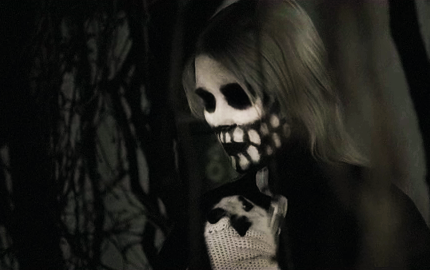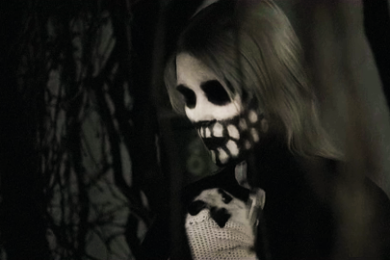While The Quietus usually likes to stay at home and lie in bed during its time off, Karin Dreijer Andersson is made of much sterner stuff. The Swedish singer recently took a break from The Knife, the stupendously brilliant pop-synth band she formed with her brother Olof Dreijer, to release a solo record under the guise of Fever Ray, write an opera about Charles Darwin and give birth to her second child. The Quietus caught up with her backstage at London’s Shepherd Bush Empire last week to see how she was coping with her impossibly hectic schedule.
Hi Karin. I guess the obvious place to start is with Fever Ray. Why did you want to take time off and work on your own?
Karin: Well, when we [her and Olof] decided to take some time off, we had been working together for seven years…very intense years. And I think when you work with one person for so long you don’t really know, in the end, what are your own ideas about music and what are theirs. You have to make compromises and collaborate, so that’s why I think it was really necessary to work completely by myself and see what kind of music I was into.
How would you say Fever Ray is different to The Knife? To me, it sounds a lot darker, more woozy…
I don’t know. I don’t compare. I don’t listen to things I’ve done before. I can’t say. It’s slower, I know.
Forgetting a comparison, then. How would you describe the record in general?
Electronic…electronic pop music. Electronic…um…I don’t know. [Laughs]. I don’t know. I’m really bad at genres, I’m not into a specific one. I listen to many types of music.
One of the most striking things about the record is how you use your voice almost as an instrument, slowing it down or changing the pitch to suit the song – so ‘When I Grow Up’ is almost childlike, while ‘Concrete Heart’ is very slow and claustraphobic. Where does that come from?
Mmmm. I think the vocals should have the same treatment as any other instrument, and when I do a lyric with a certain expression or voice, something happens. So I try to follow my initial idea for each track and find the best way to express it.
So how many approaches do you try for each track?
I try hundreds before I decide on how it should be. Although sometimes I do it in one take. I try a lot of things – I’ll add things, I ‘ll take things away until I’m done.
Lyrically, motherhood seems to be one of the strongest themes of the album, which is quite unusual in pop music – Kate Bush’s Aerial is the only other post motherhood pop album that immediately springs to mind. You gave birth to your second child before starting work on the album, what kind of influence do you think that had on your music?
Yes, I started work just after I’d had my second child. I guess it’s my reflections about that.
So you think that’s something that seeped into your music?
Absolutely. I always write about what’s going on in my life.
But although songs like ‘Concrete Walls’ explores parenthood from the perspective of a sleep-deprived mother, songs like ‘When I Grow Up’ and ‘Seven’ are written from a child’s perspective. Has having children made you revisit and explore your own childhood?
Yeah, I think that’s something that happens when you have kids. Sometimes I use their perspective on things, but it also makes you think about your own childhood. It awakes a lot of new things, and things you haven’t thought about.
That’s reflected in the dreamlike lyrics in the record, right?
Yes. Mine and my daughter’s ideas.
Can you make a distinction between your own imaginings and your daughters?
I think it’s…for me there is certain lines, some that my oldest daughter, maybe she has said or something. But I think I tried to mix it very much so it becomes a whole.
The other song I wanted to talk to you about was ‘I’m Not Done’, because it’s such a contrast to the rest of the record. It’s lighter, almost triumphant.
Yes, I think that’s the last track I did. I think I was happy that I almost finished [Laughs]. It’s interesting…it’s a little bit hysteric. But…I think I want to continue making music.
So you considered stopping?
Yes, I think there are always bits like that during the recording process.
And was it different this time because you’d just had another child? Was the feeling stronger?
No, it’s the opposite actually. I think it’s even more important to continue. I think it’s good that small girls, especially, know that women are also able to work and don’t have to stay at home.
Ok. So how are the live shows going? The Knife were very theatrical on stage, is Fever Rey going to be the same?
Yes, we are five people on stage, playing instruments. We’re in costume, and there’s smoke and lazers.
I’ve read articles before which have suggested that playing with masks on is somehow elusive, or an attempt to hide from the audience, but do you think it actually adds to a rich tradition of theatricality in music?
Absolutely. I think when you have a situation at a concert…you have an audience, you have a stage, you have lights, and you have this very theatrical room or space….I would be very sad if I couldn’t use the visual aspect of it, and use all those possibilities to create something. In theatre it’s natural to do it, you walk into the room and see a play. I think a concert should also be like that, because the visual aspect of it is really important. Otherwise…
You may as well stay at home?
Yes, you can listen to it through headphones. When you go to see a show, it must be a show. You don’t have to put five people in full costumes and all that of course, but I’ve been to Laurie Anderson, twice, and she does fantastic performances. The first time I saw her it was her alone, in just a black room, and light started to come out of her mouth…I think it’s important.
I agree. Finally, what does the future hold for The Knife? You’re working on an opera, right?
Yes, The Knife is doing an opera. An opera about Charles Darwin. We have the premiere on September 26. It’s very exciting to be part of a project so big.
Was Darwinism something you’d always been interested in?
Er…no. But since we started a year ago, I’ve been reading a lot, and it’s really interesting.



